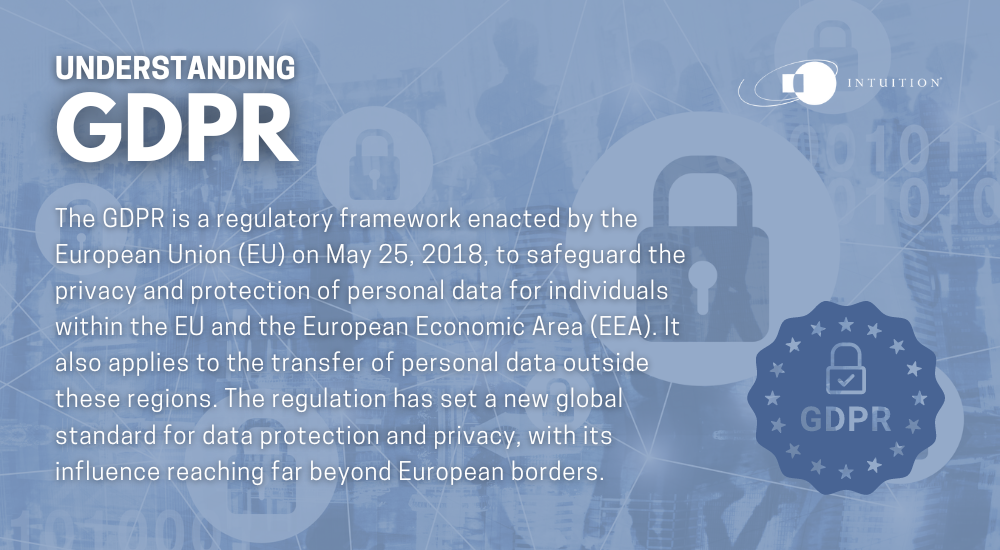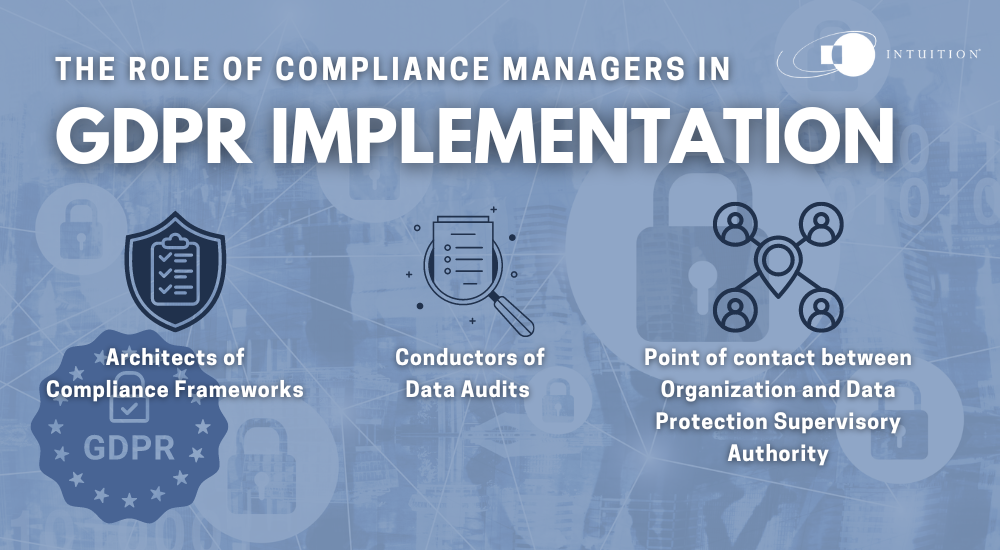How to navigate GDPR compliance challenges
Data protection is no longer a minor concern for businesses; it has emerged as a significant tenet of the digital economy. With the European Union’s introduction of the General Data Protection Regulation (GDPR), organizations around the globe have been compelled to reassess and enhance their data governance and privacy practices.
This article explores the complexities of data protection compliance in the digital age, focusing on GDPR. Compliance managers and businesses will find here a comprehensive guide to navigating the intricacies of GDPR, gaining practical tips for compliance, managing data breaches, and addressing privacy concerns in an increasingly digital world.
Related articles:

Understanding GDPR: an overview
The GDPR is a regulatory framework enacted by the European Union (EU) on May 25, 2018, to safeguard the privacy and protection of personal data for individuals within the EU and the European Economic Area (EEA). It also applies to the transfer of personal data outside these regions. The regulation has set a new global standard for data protection and privacy, with its influence reaching far beyond European borders.
The GDPR stipulates that personal data must be processed lawfully, transparently, and for specific purposes. Furthermore, the collected data must be accurate, kept up to date, and maintained only for as long as necessary. One of the fundamental principles of GDPR is giving individuals more control over their personal data, which includes access to data, rectification of incorrect information, the right to be forgotten, and the right to restrict processing.
Compliance with GDPR is not optional. Organizations in breach of GDPR can face substantial penalties, including fines of up to 20 million euro or 4% of their annual global turnover, whichever is higher. This potential for severe financial repercussions has propelled GDPR compliance to the top of the agenda for businesses handling EU citizens’ data.
The importance of data protection in the digital age
In this increasingly digital age, data could be considered the new oil, fueling innovation, business growth, and economic activity. However, just as oil must be handled responsibly to avoid environmental disasters, data must be managed with care to prevent privacy breaches and misuse.
Data breaches can have profound consequences, eroding customer trust, damaging reputations, and leading to severe legal and financial penalties. In an era where a single click can compromise sensitive information, robust data protection practices are essential. The GDPR aims to ensure that organizations are accountable for the personal data they handle and that individuals can trust that their personal data is secure.
Moreover, data protection is not just a legal obligation; it is also a matter of ethical responsibility. Businesses that prioritize data privacy can foster stronger relationships with their customers and differentiate themselves in a crowded marketplace. Compliance with data protection laws is thus a critical component of corporate social responsibility in the 21st century.
The challenges of GDPR compliance
Achieving compliance with the GDPR presents considerable practical and procedural challenges for organizations. These challenges range from understanding the intricate requirements of the regulation to implementing and integrating the necessary changes within their existing processes.
Organizations may also struggle with the requirement to obtain explicit consent for the collection and use of certain categories of personal data. Another significant challenge is the requirement for certain organizations to appoint a Data Protection Officer (DPO) who will oversee data protection strategies and GDPR compliance.
Additionally, the GDPR’s ‘right to be forgotten’ presents specific technical challenges, as organizations must devise ways to completely erase individuals’ data upon request, ensuring that no traces remain in backups or archives. The regulation’s global reach adds a further layer of complexity, as companies outside the EU must also comply with the GDPR when handling the data of EU citizens.
The role of compliance managers in GDPR implementation

Compliance managers are the linchpins of an organization’s GDPR strategy. They serve as the architects of compliance frameworks, ensuring that policies, procedures, and practices align with GDPR requirements. A compliance manager’s role calls for a comprehensive understanding of the regulation and an ability to translate it into concrete, actionable steps for various departments.
One of the primary responsibilities of a compliance manager is conducting data audits to identify all the areas where their organization processes personal data. This encompasses data collection, storage, access, and transfer. They must work closely with IT departments to implement the necessary technical controls, such as encryption and access management, as well as with HR to train staff on data protection policy.
Compliance managers also serve as the point of contact between the organization and the data protection supervisory authority. They must be prepared to demonstrate compliance at any time, which means maintaining meticulous records of data processing activities and ensuring that privacy impact assessments are conducted for high-risk data processing.
Practical tips for ensuring GDPR compliance
Ensuring GDPR compliance requires a proactive and comprehensive approach. Here are several practical strategies that organizations can implement to meet the regulation’s rigorous standards:
- Conduct a data audit: Map out all data processing activities and categorize the data being processed. Understanding the flow of personal data within and outside the organization is crucial in identifying areas of risk.
- Update privacy notices: Ensure that privacy notices are clear, concise, and transparent. They should inform individuals of their rights under GDPR and explain how their data will be used.
- Implement data protection by design: Integrate data protection considerations into new products, services, or processes from the outset, rather than as an afterthought.
- Train employees: Regular training on data protection principles and GDPR requirements should be mandatory for all employees handling personal data.
- Establish a data breach response plan: Have a clear plan in place for detecting, reporting, and investigating a personal data breach. This should include procedures for notifying the relevant authorities and affected individuals without undue delay.
- Regularly review and update data protection measures: Data protection is not a one-time task but an ongoing process. Regularly review policies, procedures, and technical measures to ensure they remain effective and compliant with GDPR.
Handling data breaches: A guide for compliance managers
Data breaches are a significant concern in the digital age, and GDPR has strict requirements for how to handle them. Compliance managers must be adept at managing such incidents to minimize harm and comply with legal obligations.
When a data breach occurs, a compliance manager’s first action should be to assess the scope and impact of the breach. They must then ensure that the breach is contained and that measures are taken to prevent any further unauthorized access to personal data.
The GDPR requires that all data breaches likely to result in a risk to the rights and freedoms of individuals must be reported to the relevant supervisory authority within 72 hours of the organization becoming aware of it. When a data breach poses a high risk to individuals, those affected must also be informed without undue delay.
Compliance managers play a critical role in documenting the breach, the organization’s response, and any measures taken to strengthen data protection. This documentation is vital for demonstrating compliance with GDPR requirements and for learning from the incident to prevent future breaches.
Addressing privacy concerns in the digital world
Privacy concerns are at the forefront of consumer minds in the digital world. Constant and ever-increasing media coverage of data breaches and misuse of personal information has heightened awareness and anxiety about privacy across the world. Addressing these concerns is not only a regulatory requirement but also a business imperative for building trust and loyalty with customers.
Compliance managers can help address privacy concerns by ensuring that their organization adopts a transparent approach to data collection and processing. This includes clearly communicating to individuals what data is collected, for what purposes, and how it is kept secure.
Another key aspect is empowering individuals with control over their personal data. Additionally, organizations should adopt a privacy-centric culture, where data protection is embedded throughout the organization.
Case study: Successful GDPR compliance examples
Examining the GDPR compliance journey of successful organizations can provide valuable insights and highlight best practices. One such example is a multinational corporation that implemented a robust GDPR compliance program, which included the establishment of a dedicated data protection team, comprehensive data audits, and the deployment of advanced data security technologies.
The corporation also revamped its privacy policies, ensuring they were written in clear, accessible language. They introduced regular training sessions for employees to foster a culture of data protection awareness. As a result, the corporation not only achieved GDPR compliance, but also enhanced its reputation as a trustworthy and responsible handler of personal data.
Another example is a small e-commerce business that utilized GDPR compliance to its advantage by differentiating itself in the marketplace. The business ensured that its data processing activities were transparent and that customers had easy access to their personal data. This commitment to privacy became a unique selling proposition, attracting customers who valued data protection.
Resources and tools for GDPR compliance
Compliance managers seeking to navigate the complexities of GDPR compliance have several resources and tools at their disposal. The European Data Protection Board (EDPB) provides guidelines, recommendations, and best practices for GDPR compliance. Professional organizations often offer training programs, workshops, and seminars on data protection laws.
There are also various software tools designed to assist with GDPR compliance. These include data mapping solutions, data privacy impact assessment tools, and consent management platforms. Such tools can help streamline compliance efforts and ensure thorough and consistent data protection practices across the organization.
Legal counsel specializing in data protection laws can also be invaluable, offering tailored advice on GDPR compliance and helping to interpret the regulations in the context of specific business activities.
Conclusion: The future of data protection and GDPR compliance
As we look to the future, the importance of data protection and GDPR compliance is set to grow. The digital economy continues to expand, fueled by technological advancements and an ever-increasing amount of personal data being generated and processed. Organizations that embrace GDPR and view it as an opportunity to enhance their data protection practices rather than as an existential threat or bureaucratic nuisance will be well positioned to succeed in this evolving landscape.
Compliance managers will remain instrumental in steering their organizations through GDPR, ensuring that privacy and data protection are integral parts of the business strategy. Their expertise will be crucial in adapting to future regulations and maintaining the trust of customers and stakeholders.
As data continues to shape our world, GDPR compliance is not just a legal obligation — it is a commitment to respecting individual privacy and securing the digital future for all.


